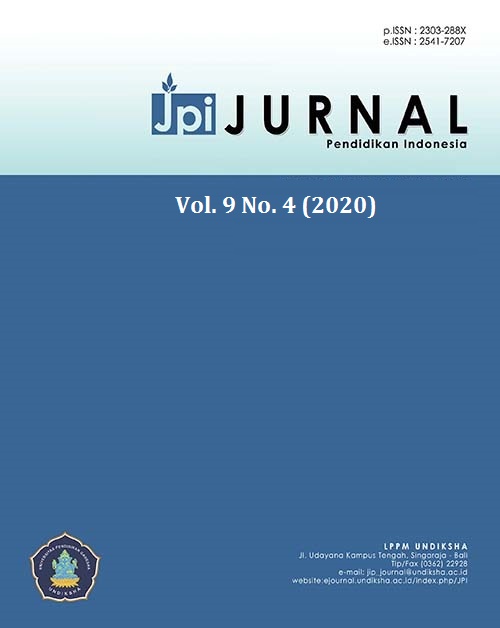The Urgency of Social Problematic as Sex Education Material and Media In PAUD
DOI:
https://doi.org/10.23887/jpi-undiksha.v9i4.18151Keywords:
sex education, learning media, early childhood education, child protectionAbstract
This study aims to analyze the influence and relationship as a form of conformity between the application of material and learning media in sex education in Early Childhood Education (PAUD) in child protection efforts. The research sample was 34 teachers in Surabaya who were randomly selected. This research uses an ex post facto quantitative approach with data collection techniques using a questionnaire. The analysis technique uses simple linear regression because this study did not do anything so only wanted to find out whether there is an influence and the relationship between the application and sex education material in learning media in PAUD. The results of this study are tcount> t table and p value (sig) of 0.036 (<0.05) means that Ho is rejected and Ha is not rejected (accepted). Based on the results of this study it can be concluded that there is a significant conformity (13.1%) between the application of material and media, especially about social problems in sex education in early childhood education which is most important and urgent to give to children.
References
Adhani, D. N., & Ayu, R. (2018). Pendidikan Seks pada Anak Usia Dini Dipandang Dari Agama Islam. Science Education National Conference, 235–242. https://doi.org/10.32763/juke.v8i01.71
Astuti, B., Sugiyatno, S., & Aminah, S. (2017). The Development of Early Childhood Sex Education Materials for Early Childhood Education (ECE) Teachers. Jurnal Pendidikan Dan Pemberdayaan Masyarakat, 4(2). https://journal.uny.ac.id/index.php/jppm/article/view/14869/pdf
Aziz, S. (2015). Pendidikan Seks Anak Beekebutuhan Khusus. Gava Media.
Baidawi, A. (2016). Using Visual Media in Teaching Speaking. OKARA Journal of Languages and Literature, 10(1). https://doi.org/http://dx.doi.org/10.19105/ojbs.v10i1.811
Breuner, C. C., Mattson, G., Adolescence, C. O., & Health, C. O. P. A. O. C. A. F. (2016). Sexuality Education for Children and Adolescents. Pediatrics, 138(2). https://doi.org/10.1542/peds.2016-1348
Brown, J. (2013). The NSPCC Underwear Rule Campaign (Encouraging and enabling parents to talk with children to help keep them safe). Conference on Preventing Sexual Abuse of Children.
Crain, W. (2014). Teori perkembangan: Konsep dan aplikasi. Pustaka Pelajar.
Dewi, K. (2017). Pentingnya Media Pembelajaran Untuk Anak Usia Dini. Raudhatul Athfal: Jurnal Pendidikan Islam Usia Dini, 1(1).
Febrianti, F., Mahmud, A., Amir, A., & Haling, A. (2018). Sex Education Learning Module Development for Senior High School Students in Makassar City. IOSR Journal of Research & Method in Education (IOSR-JRME), 8(2), 59–63. https://doi.org/10.9790/7388-0802035963
Haberland, N., & Rogow, D. (2015). Sexuality Education: Emerging Trends in Evidence and Practice. Journal of Adolescent Health, 56.
Idha Zakiah Ibrahim, Rahmaniar, Zainal, N. A., Mildawati, & Rahmaliah, A. R. (2018). Penyalahgunaan Sosial Media Pada Anak Di Bawah Umur Dalam Mengakses Pornografi. https://doi.org/DOI: 10.13140/RG.2.2.11810.89288
Ita, E. (2018). Manajemen Pembelajaran Pendidikan Anak Usia Dini Di TK Rutosoro Kecamatan Golewa Kabupaten Ngada Flores Nusa Tenggara Timur. Jurnal Dimensi Pendidikan Dan Pembelajaran., 6(1).
Leung, H., Shek, D. T. L., Leung, E., & Shek, E. Y. W. (2019). Development of Contextually-relevant Sexuality Education: Lessons from a Comprehensive Review of Adolescent Sexuality Education Across Cultures. International Journal of Environmental Research and Health, 16(4). https://doi.org/10.3390/ijerph16040621
Prastya, A. (2016). Strategi Pemilihan Media Pembelajaran Bagi Seorang Guru. Prosiding Temu Ilmiah Nasional Guru (Ting) Viii - Universitas Terbuka Convention Center.
Purwanto, M. (2011). Prinsip-prinsip dan Teknik Evaluasi Pengajaran. PT. Rosda Karya.
Putri, S. D., & Citra, D. E. (2019). Problematika Guru Dalam Menggunakan Media Pembelajaran Pada Mata Pelajaran IPS di Madrasah Ibtidaiyah Darussalam Kota Bengkulu. IJSSE: Indonesian Journal Of Social Science Education, 1(1). https://journal.uny.ac.id/index.php/jppm/article/view/14869/pdf
RG. (2017). Tidak Semua Film Kartun Aman untuk Anak. KPAI.
Rilianti, A. P., & Ima, A. (2011). Play Study: Educational Game Sebagai Media Belajarpendidikan Seks Bagi Anak Sekolah Dasar. Pelita - Jurnal Penelitian Mahasiswa UNY, 6(2).
Robinson, K. H., Smith, E., & Davies, C. (2017). Responsibilities, tensions and way forward: parents’ perspectives on children’s sexuality education. Sex Education, 1–15.
Sakat, A. A., Zin, M. Z. M., Muhamad, R., Ahmad, A., Ahmad, N. A., & Kasmo, M. A. (2012). Educational Technology Media Method in Teaching and Learning Progress. American Journal of Applied Sciences, 9(6).
Sanjaya, W. (2010). Perencanaan dan Desain Sistem Pembelajaran. Prenada Media Group.
Saraswati, D., & Wijayanti, A. (2018). He Developing Of Tematik Teaching Media Magic Puzzle Theme Of “Berbagi Pekerjaan” In Fourth Grade Of Primary School. (JPDN), Jurnal Pendidikan Dasar Nusantara, 4(1).
Saraswati, P. D. A. (2018). KPAI Pertanyakan Motif Penulis Buku Balita Memuat Konten LGBT. CNN Indonesia.
Sidabutar, R., & Suhatrizal. (2019). Perlindungan Hukum terhadap Anak yang Melakukan Tindak Pidana Pencabulan pada Putusan. Jurnal Ilmiah Penegakan Hukum, 5(2).
Siregar, S. (2014). Metode Penelitian Kuantitatif. Kencana Prenamedia Group.
Sukmahidayanti, T. (2015). The Utilization Of Instructional Media In Teaching English To Young Learners (A Case Study of an Elementary School Teacher in Bandung). Journal of English and Education, 3(2).
Tabatabaie, A. (2015). Childhood and adolescent sexuality, Islam, and problematics of sex education: a call for re-examination. Sex Education, 15(3), 276–288. https://doi.org/10.1080/14681811.2015.1005836
Widodo, S. A., & Wahyudin. (2018). Media Mathematics for Junior School Students. TOJET: The Turkish Online Journal of Educational Technology, 17(1).
Yusuf Asyari. (2017). Duh, Buku Anak dengan Konten Seks Beredar. Jawa Pos.
Downloads
Published
Issue
Section
License
Authors who publish with the Jurnal Pendidikan Indnesia agree to the following terms:
- Authors retain copyright and grant the journal the right of first publication with the work simultaneously licensed under a Creative Commons Attribution License (CC BY-SA 4.0) that allows others to share the work with an acknowledgment of the work's authorship and initial publication in this journal.
- Authors are able to enter into separate, additional contractual arrangements for the non-exclusive distribution of the journal's published version of the work (e.g., post it to an institutional repository or publish it in a book), with an acknowledgment of its initial publication in this journal.
- Authors are permitted and encouraged to post their work online (e.g., in institutional repositories or on their website) prior to and during the submission process, as it can lead to productive exchanges, as well as earlier and greater citation of published work. (See The Effect of Open Access)








